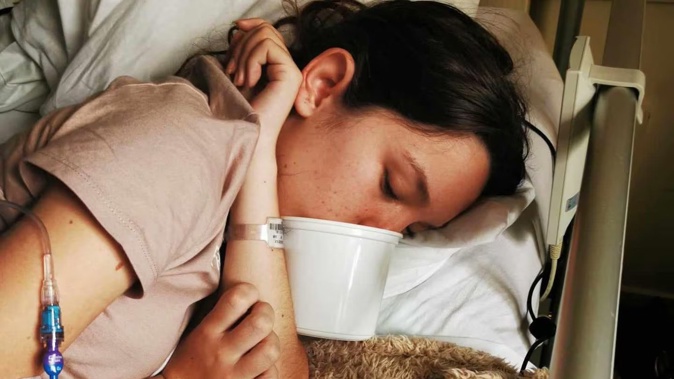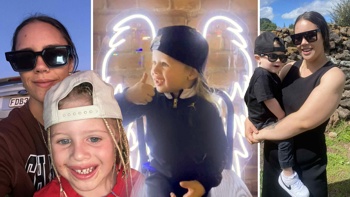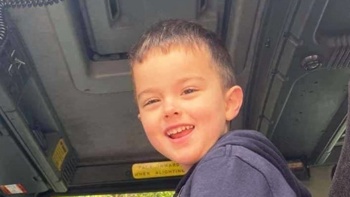
An 18-year-old girl diagnosed with likely Ehlers-Danlos Syndrome (EDS) has been refused treatment in New Zealand as doctors claim she is faking her symptoms. Following the recent deaths of Stephanie Aston and two other women with EDS, Jaime Lyth traces the story of Trinity Hutchins and her bid for surgery in Germany that she believes can save her life.
Trinity Hutchins has spent her formative teenage years covered in tubes and bedridden in pain due to Ehlers-Danlos Syndrome (EDS) related illness.
Now the 18-year-old from Hawke’s Bay and her family say the New Zealand health system wants nothing to do with her.
Since her infancy, Hutchins has had surgeries and treatments for blockages and issues in her bowels and overall chronic intestinal failure.
Her medical file is an eyewatering read of invasive anal and rectal examinations and surgeries and a life of colostomy bags and feeding tubes.
But Hutchins’ care suddenly hit a roadblock in February when she suffered from an internal bleed, her mother Anna McGrath said, and two days after her 18th birthday Hutchins was accused of self-harming and faking her illness.
“The psychiatrist was in the room that we got pulled into when I was accused of the factitious disorder, but that was my first time meeting her, then and there,” Hutchins said.
Hutchins now has “suspected factitious disorder” as a permanent diagnosis on her medical file - even though she says she has never been assessed by a psychiatrist - and has been refused treatment by hospitals as a result.
“I’ve never been so appalled about anything in my life,” said McGrath. “I’m absolutely disgusted in our health system, and doctors are not held accountable.
“When we walked out from that meeting, I heard the most chilling words ever come out of their mouths, and that was the fact that we had taken things better than most.”
/cloudfront-ap-southeast-2.images.arcpublishing.com/nzme/L4A42IUJEBHZTJPDAIGK6VN2NU.jpg)
Trinity Hutchins has been in and out of hospital since she was 2 years old. But when she turned 18, she was accused of pretending she was ill.
A letter from Auckland City Hospital seen by the Herald accuses Hutchins of tampering with her own blood and hiding syringes in her bed.
“We have explained that we are concerned that someone has been interfering with her central line and sucking blood off this and demonstrating this as evidence of haematemesis [internal bleeding which causes vomiting],” the letter reads.
“Two syringes fell out of Trinity’s bedclothes when she was being examined and there was no explanation for these. I understand she took these back from the registrar and placed them in her [clothes],” the letter reads.
Hutchins’ recollection of this incident is different. She says she was half asleep when a staff member came in and asked her to roll over on the bed when they found a single PosiFlush syringe (normally used for cleaning out IV lines), filled with saline and without a needle.
Medical notes also show that nurses and medical carers witnessed Hutchins vomiting blood while under supervision during the admission.
Te Whatu Ora would not comment on individual patient care for “ethical and privacy reasons”, despite Hutchins giving the Herald consent to ask about her treatment.
Te Whatu Ora also did not respond to specific questions about its procedure for diagnosis of factitious disorder, and whether a psychiatric assessment or consultation should be completed before diagnosis.
The public health agency said “a careful assessment will be followed by an individualised treatment plan” for the diagnosis of factitious disorder.
Te Whatu Ora did not respond to the Herald’s specific questions about the procedures staff use if they suspect a patient is self-harming, or if a patient is found with medical equipment on them.
“We have empathy for Trinity on her health journey and as with any member of the public, should Trinity need hospital or specialist services care, we would carefully assess her clinical needs and provide appropriate care,” Te Whatu Ora operations director Dr Mike Shepherd said on behalf of the health agency.
Te Mata Peak Practice specialist GP David Doig doubts the diagnosis of suspected factitious disorder and has concerns for Hutchins’ life.
“Trinity’s blood loss was recorded to be so severe that she might have died and did require blood transfusions to stabilise.
“She is adamant that she did not cause this bleeding herself, and the suggested mechanism for her making this happen does not seem plausible in the way the hospital team has described.
“I do have concerns for her wellbeing now and survival in the medium term.”
Doig said he believed Hutchins had an unspecified connective tissue disease, not yet diagnosed but sharing some common features with Ehlers-Danlos syndrome (EDS).
“In the absence of the full transcript from the treating team, it is very hard for me to accept the conclusions they reached and my own impression and opinion is that the undiagnosed medical conditions were the more probable cause of her critical bleeding presentation.”
“The treating team in Auckland Hospital were unaware of two critical diagnoses at the time of Trinity’s hospital admission, diagnosed later by experts in these fields. These were a connective tissue disorder (similar to Ehler‘s-Danlos Syndrome but the exact type is not yet clarified) and abdominal vascular compression syndromes,” Doig said.
EDS patients accused of faking illness
In 2018, the Herald published a series of stories about four women who had struggled to get diagnosis and treatment for Ehlers-Danlos. Many recall being told they were faking their illness and were refused treatment as a result.
Three of those women diagnosed who struggled to have their illness recognised have died in the past three months.
One of those women was Stephanie Aston, an advocate for the Ehlers-Danlos Syndromes community who was told she faked her symptoms. Aston died in September.
Hutchins knew Aston through her advocacy support. After Aston’s death, Hutchins says, she’s become even more frightened, as she gets weaker, about what she believes is a lack of support for her illness in New Zealand and a tendency to look for psychological rather than physical explanations.
“When I gave up arguing with them all the time ... and was just doing whatever they said, in one of the reports it said that I was too calm, unbothered,” Hutchins said.
Kelly McQuinlan, the chief executive of Ehlers-Danlos Syndromes New Zealand, said misdiagnosis and a lack of awareness are leading to preventable deaths of people with EDS in New Zealand.
“EDS has clear clinical diagnostic pathways for diagnosis, and in New Zealand we are slowly building our expert base, but we continue to be met with medical professionals who ‘don’t believe’ these disorders.
“In the last 12 months, we have had multiple untimely deaths in our Ehlers-Danlos Community in New Zealand. Three of these passings were in a previous series of articles with NZ Herald in 2018.”
McQuinlan said human rights are being breached because EDS patients aren’t getting adequate healthcare.
“The issue becomes when we have medical professionals unwilling to learn and research, and also lack of awareness and education for medical disorders, leading medical professionals to label consumers with mental disorders ...”
McQuinlan said mental disorders are viewed by some as a convenient escape route for grappling with intricate medical conditions.
Fundraising for life-saving treatment in Germany
With no support for her condition in New Zealand, Hutchins’ family sought private advice from a leading German vascular surgeon, Dr Wilhelm Sandmann, who confirmed the urgent need for compression surgery.
The family have created a Givealittle page to raise the $180,000 in funds needed for travel, surgery and post-operative care for Hutchins. They run a Facebook page with updates for family and friends, along with auctions and other methods of raising money.
It’s the same surgery a 17-year-old Dunedin girl, Olivia Aldie, received from Sandmann’s team this year, which she describes as “life-saving”.
Aldie could hardly walk or eat due to vascular compressions and EDS and was dropping weight despite having a feeding tube and IV fluids.
“I now live with some colour in my face, and the ability to walk, stand and be around people for multiple hours at a time.
“While yes, I will always be sick, I am no longer dying. The recovery from this surgery and chronic illness in general is a marathon, not a sprint.
“I now have hope and a life I never expected to ever have. I was left all alone by the NZ health system waiting to die. Which sadly is the reality for most of us with these compressions and with Ehlers-Danlos Syndrome.”
/cloudfront-ap-southeast-2.images.arcpublishing.com/nzme/NU3BNB5K7FGK3J556DEO5X7ZC4.jpg)
Trinity Hutchins is an enthusiastic equestrian and hopes to study zoology at university one day.
The Herald also spoke to Jaimee Gregory on her 18th birthday after she travelled to Germany to receive treatment for EDS and other related issues.
Gregory said the surgery allowed her to regain a semblance of the life of a typical Kiwi teen.
“We’re going out shopping. I haven’t had a birthday thing in years,” she told the Herald in September.
Gregory, much like Hutchins, was often written off as difficult or labelled with psychological and hypersensitivity issues.
Gregory’s mother said treatment in Germany was a realisation of what proper hospital care should look like for Jaimee, after she felt her daughter was being ignored and treated incorrectly through the system at home.
McGrath said Hutchins has always had gut issues, and she had her first major surgery when she was just 7 years old.
“She started getting the occasional bowel obstruction kind of thing happening as she was entering puberty.
“By the time she was about 15, eating started to become an issue. She would eat and then it would increase her pain a great deal and result in vomiting and nausea and things have just progressively gotten worse.”
Hutchins was put on TPN [total parenteral nutrition or intravenous feeding], about two-and-a-half years ago, while McGrath has had to learn how to give her daughter IV expressions and central-line feeding from home.
“I was perfectly willing to learn to do these medical procedures in order for Trinity to be home and spend less time in hospital.
“Or else it was just weeks upon weeks and hospital.”
The TPN was removed from Hutchins in February and she has not been receiving any nutritional support or a replacement feeding tube at all since her tube broke in July.
McGrath said that as a result of all of this, Hutchins has already lost about 13kg since February.
Hutchins is a keen equestrian and McGrath dreams of the day when her daughter can live a life free of pain and can eat again.
Despite being too sick to attend school in person since 2020, the teenager has been completing courses online, with a university dream at the end of the tunnel.
Despite having to complete her education in between lengthy hospital stays and flare-ups she still managed to graduate high school thanks to the fantastic support from Tamatea High, McGrath said.
“She is desperate to go to university and study zoology ... that has been her goal since she was about 4 years old.”
Without the public’s help, McGrath said, there is no way they will be able to get Hutchins the treatment she needs.
Take your Radio, Podcasts and Music with you









